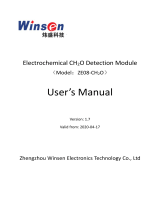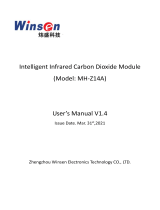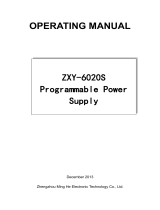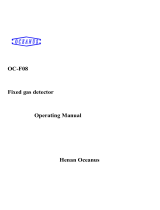Tel: 86-371-67169097/67169670 Fax: 86-371-60932988 Email: sales@winsensor.com
Leading gas sensing solutions supplier in China!
Note:
The picture shows the data comparison between the conventional ZH06 laser particle sensor and
TSI8530 in the test environment.
Abscissa : Testing time related parameters
Ordinate : The concentration of particles in the test environment (with TSI8530 data as reference, unit:
μg /m³, environmental resolution: 1μg/m³).
Attentions:
1. It is forbidden to remove the shield cover of the sensor and the internal fixing screw of the sensor,
because the shield cover of the sensor is connected with the internal power supply of the sensor
through the internal spring. If the shield cover of the sensor is removed, the anti-interference ability
of the sensor will be poor, the output value of the sensor will change, and the performance of the
sensor will be poor. In addition, and please pay attention to the metal shield of the sensor, avoid
contact with other external circuits or conductive parts, so as to reduce the impact of external
interference on the sensor.
2. Excessive impact or vibration will affect the accuracy and life of the sensor detection value, so the
sensor should avoid falling or vibration when installing and using.
3. This sensor is suitable for the detection of dust particles in the ordinary indoor environment. The
actual working environment should try to avoid oil&smoke environment, too large dust particles, high
humidity environment, such as: kitchen, bathroom, smoking room, outdoor environment, etc. If it is
used in such environments, corresponding protective measures shall be added to the user's
equipment to prevent viscous particles or large particles from entering the interior of the sensor and
forming accumulation in the interior of the sensor which will affect the performance of the sensor.
(for example, in the working environment with floccules or fibers, the corresponding coarse filter net
should be added ahead the air inlet of the sensor to avoid floccules or large sundries from entering
the sensor and blocking the light path of the sensor, thus affecting the detection accuracy of the
sensor.)
4. The fan is the air outlet, and the dust collection hole is the air inlet. During the using of the sensor,
the sensor should not be directly placed inside the air duct of the purifier. If it cannot be avoided, an
independent space structure should be set up for the installation position of the sensor. The air flow
direction is as shown in ‘Installation Method’. The sensor should not be impacted by the air flow in
the direction of the red arrow. There should be no obstructions within 2cm around the outlet of the
fan. In this independent space, it should be avoided that the air flow from the outlet directly flows
back to the inlet, which will affect the accuracy of detection.
5. Under normal working condition of normal temperature&pressure, the key component of the
sensor-laser,can work continuously for more than 10000 hours, and the life of the sensor can be
greatly prolonged by setting the sensor's sleep mode and interval working time. The maximum
cumulative life of the sensor can be more than 3 years. Please refer to the user interface instructions
for detailed operation methods, or you can contact our technical service staff by telephone or email.
6. The sensor data mentioned in this manual is about to ensure the consistency of the sensors we
produced, the comparison standard will not refer to any third-party testing instruments or data . If
the user wants the final detection results to be consistent with the third-party testing instrument, the
user can do data fitting correction according to the actual detection results.

















